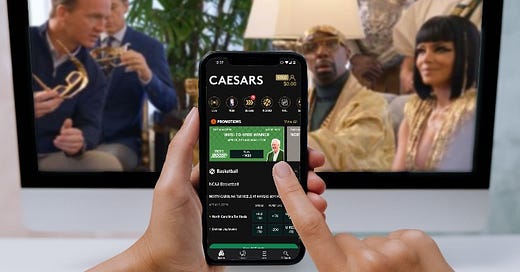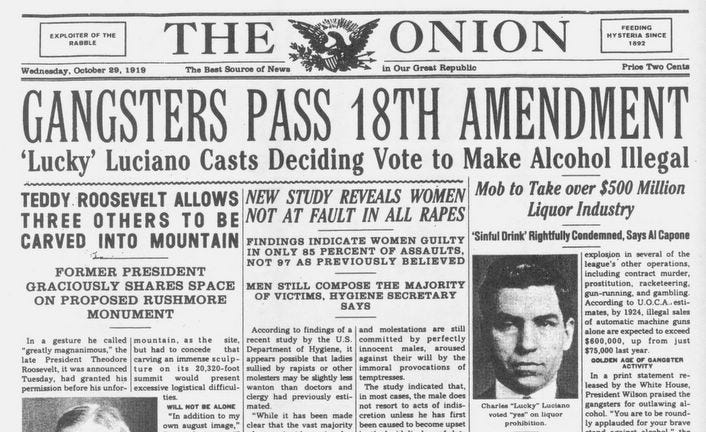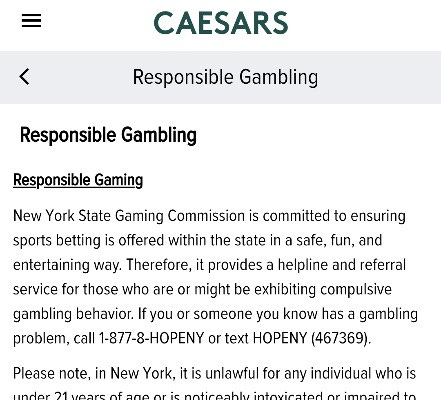I'll Give You 2:1 Odds That We Can Decrease Problem Gambling. Okay, 3:1. No, 4:1. Come On, I Need This.
It's a lock!
America is sliding toward bacchanal, which I think is fantastic. The conventional wisdom says that our politics is gridlocked, but I disagree; on social issues, I see a tectonic shift towards more freedom in our personal lives. Attitudes towards sex, sexual orientation, and light drug use have changed dramatically. Broad cross-sections of Americans now recognize their fellow citizens’ right to inhale, suck, imbibe, trip, finger, toke, and even Cambodian Jackhammer in a manner of their own choosing.
This attitude shift extends to gambling. Sports gambling is now legal in 31 states, including most of the good ones. It will probably be legal just about everywhere soon. In New York, we seem to have passed a law requiring that every commercial on TV be about sports betting; Kim Jong-un gets less airtime on North Korean state television than Caesars Sportsbook spokespersons Patton Oswalt and JB Smoove do in New York. I’ve also started to wonder if there’s a barbershop anywhere in the state where a gambling podcast isn’t currently being blasted at 100 decibels.
For better or for worse, sports gambling is part of our lives. My liberal tendencies lead me to believe that legality is mostly for the better, but I’m not blind to gambling’s dark side. Some people have gambling addictions that will spiral out of control, and the nature and design of sports betting apps make it more likely that — for some people, at least — things will spiral out of control. Which has me thinking about ways that we might be able to help people take some of that control back.
Gambling has long been illegal in the United States. Except for Nevada, New Jersey, Indian reservations, riverboats, horse tracks, dog tracks, off-track betting sites, lotteries, bingo, raffles, fantasy sports, online gambling, overseas sites, private games, and every office in America during the month of March. And, also, if you think about it: stocks, bonds, crypto — securities of any type, really — as well as collectibles, commodities, real estate, and the credit industry. Really anything that you can do with money more complex than buying a Snickers bar is, in a sense, gambling. But other than those 24 exceptions, gambling has long been illegal in the United States.
Trying to eradicate gambling is probably not possible or wise. When people really want to do something, outlawing it or overregulating it just pushes it into the black market. And the black market amplifies bad outcomes because it’s dominated by crooks and predators, as captured in this headline from The Onion’s “Our Dumb Century” book:
It’s worth mentioning that gambling can be fun. Debates over legal gambling typically include harrowing tales of ruin and promises of easy tax revenue; they almost never include the simple observation that gambling is enjoyable. It can make a sport like baseball borderline watchable, and for most people who do it, it’s benign entertainment. Personally, I don’t partake in fun; my family is German Protestant, and we believe that fun is a foul temptress that seduces good Christians away from a rewarding life of brutal toil. But I know that other people enjoy fun. So, I try to respect their right to have fun, because it seems to be a positive force in their lives and not — as my grandma would put it — “a plot by Satan to turn us into Iberians.”
But gambling can ruin lives. It’s hard to say who’s to blame when gambling leads to disaster. Is it the person’s fault for making bad decisions? Is it society’s fault for allowing a bad outcome that was foreseeable? Is it Seahawks’ kicker Jason Myers’ fault for shanking a 30-yard chip shot that a fucking baby could have made so that Seattle didn’t cover the spread? Cases can be made for all of these. But no matter what you think the problem is, you probably agree that it would be better if gambling destroyed fewer lives.
Smartphones are amplifying some of gambling’s most addictive properties. Betting apps like Caesars, DraftKings, and Fanduels make betting easy, accessible, and far more likely to result in you offering $5 hand jobs to truckers outside a Waffle House. Of course, the apps’ marketing typically downplays the third part of the experience (cynical!). The biggest way that things have changed is that you can gamble from anywhere. That’s a game-changer; one of the most underrated facets of human nature is our deep aversion to putting on pants and leaving the house. Amazon has basically built an empire on the knowledge that people hate pants. In much the same way that trading apps changed how people trade stocks, gambling apps are changing how people bet on sports.
These apps are sophisticated operations. This is not some humble bingo fundraiser in a sad-ass church basement: These are corporations worth tens of billions of dollars building apps using the most occult of Silicon Valley’s dark arts design techniques. Las Vegas attracts people with Wayne Newton and the possibility of a skeevy sexual encounter; sports betting apps draw you in using perks, promotions, and an endless variety of bets you can place. Want to bet on the Nepalese professional cricket league? We’ve all thought about it — after all, the Pokhara Rhinos’ bowlers have recently been skittling out batsmen like they’re Muttiah Muralitharan. Open up your sports app and see what action you can find. In an interconnected world, there are almost no limits to what bets you can place.
The big trend on sports betting apps right now is parlay bets. A parlay is a series of bets tied together — the movie Uncut Gems (spoiler) ends with the main character winning big on a parlay bet. Of course, it also ends with him being shot in the face, but it seems that some people saw that and still thought “I wish that was me”. Sportsbooks love parlays because they typically give the house a larger edge than straight bets. But betters still go for them, probably because despite the hitting-a-hole-in-one-while-being-attacked-by-a-shark odds, they offer huge payouts. Scoring big on a parlay can change your life; scoring modestly on a sober bet can net enough money for a new printer cartridge. You can understand the psychology. Plus, parlays have considerable “epic story you can tell your bros” appeal, which shouldn’t be underestimated.
Basically: Sports apps offer an engrossing and user-friendly betting experience. Perhaps too engrossing and user-friendly. In many ways, they draw from the same design playbook that now has Twitter and Facebook backpedaling. People who want to slow the impulsive use of social media apps often talk of “friction”, i.e. inserting steps that a user has to take before completing an action. The idea is that users would have to act deliberately instead of responding impulsively to induced mania, which is a change that Facebook and Twitter often resist, because that induced mania has made them some of the richest companies in the world.
The concept of friction might help reduce problem gambling. One good thing about legal gambling is that we can take steps to give people the ability to tap the breaks when they feel things veering out of control. But in order to do that, we have to actually do that. And right now, we sort of haven’t; we have definitely done the part where we legalize gambling and create clever, high-budget ad campaigns, but the part where we develop common sense support infrastructure is lagging behind.
So, here are some things we should probably consider doing.
1. Responsible gaming provisions should exist and have teeth.
Many states have a process through which gamblers can restrict their own ability to gamble. They can set limits, create “cooling off” periods, or even lock themselves out for a specified period of time. It’s basically Ulysses tying himself to the mast, or — if you prefer — the episode of Peep Show where Super Hans gives Mark his crack pipe and says “Don’t give it to me, even if I hit you with wood.”
I think these measures are a no-brainer. This is a way to prevent problem gambling without telling adults how to run their lives; this is empowering people to make decisions for themselves.
Unfortunately, responsible gaming provisions often have a “Jack Daniels encourages you to drink responsibly” kind of feel to them. In New York, Caesars Sportsbook gives you a popup window when you first install the app, but after that, the responsible gaming stuff is way down the page. I had to scroll past about 50 opportunities to gamble to find it at the very bottom. And, on an app whose design style is “Elvis-era Vegas meets Roman orgy”, the responsible gaming page has the aesthetic verve of a Soviet grain silo. This makes the phone book look like a poster for a Japanese laser lights show:
Creating legal requirements for a product interface is always difficult, but it seems like we can do better than we’re doing. At the very least, the responsible gaming info should probably reappear from time to time, much like Netflix’s “Jesus, are you still watching TV you lazy fuck?” pop-up window.
Many states have weak or nonexistent requirements. Enforcement infrastructure is spotty; a few states that allow gambling don’t even have gaming commissions. There need to be clear, functional programs in place with penalties for companies that break the rules — without that, responsible gaming programs are about as effective as Mark was with Super Hans’ crack pipe:
2. We should expand treatment for gambling addiction.
Insurance coverage for gambling addiction treatment under Medicaid is spotty. Coverage under private insurance is hit-and-miss. Though the number of states that fund gambling treatment services is growing, ten still don’t, and several others are underfunded. The Substance Abuse and Mental Health Services Administration — the main federal agency that deals with addiction problems — does not directly handle gambling addiction. In fact, there is no federal agency tasked with addressing problem gambling.
The lack of support seems idiotic. You can get treatment for substance abuse, as well you should; you don’t need a federal study to know that helping someone beat a substance problem is extraordinarily cost effective from a societal point of view. But here’s a federal study anyway: They found an $18 return for every $1 invested, and presumably it would have been a bit higher if they hadn’t paid for the study.
Gambling addiction is real, and restricting treatment is penny wise and pound foolish. This won’t be abused; people who don’t have gambling problems aren’t going to chat with a therapist about a fake gambling addiction just for the sheer fuckery of the experience. Expanding coverage for gambling addiction can help people take control of their lives.
3. We should consider banning credit cards on gambling apps.
This would be a big move; sportsbooks would hate this. And it would annoy ordinary users — they’d have to use bank accounts or something similar. But it’s harder to get deep in the hole when you don’t have fast access to credit.
In 2020, the UK banned using credit cards to place bets. Gambling, of course, is as deeply embedded in British culture as train wine or wearing flip flops in 50 degree weather. Whenever a Premier League team is sponsored by a company that you’ve never heard of, that’s a gambling app. So, there were surely a few punters who threw a wobbly when this regulation passed, but the UK is trying it, so we’ll see how it goes.
I’m comfortable with — even enthusiastic about — using the UK as a lab rat. We should have good data within a few years; the UK, unlike the US, does have a federal agency dedicated to problem gambling, which makes data collection easier. Before long, we’ll have a sense of whether banning credit cards is a meaningful step that helps keeps things under control or a late-era-Covid style pointless annoyance that does nothing.
Of course, not every solution is legislative. Maybe the biggest thing we can do to discourage problem gambling is to strengthen the societal norm that gambling is a fun diversion, not a source of income. To hell with your “system”, fuck your Mentaculus — the only reliable way to make money off of sports betting in the long term is to be the casino. Or to be Patton Oswalt or JB Smoove, I guess.
I continue to believe that adults should to be free to make their own choices. I think that the major advances in social liberalism that we’ve seen over the past few decades are a good thing. But we don’t face a binary choice between the Nanny State and Thunderdome; there are intermediate steps we can take to curb problem gambling. I think there are pathways to progress that aren’t prohibition. In fact, I’d be willing to bet on it.







Loved this, especially how practically-minded it was--I also appreciate anyone on the left who is willing to acknowledge that gambling can be fun. I'm definitely from the YSM myself (to be clear, NOT the Yale School of Medicine, the Yuppie Soyboy Mediasphere), and had gone along with the judgmental tongue-clicking of my cadre when it came to gambling for years, but then I had to do research on casino operations for a writing project, and I wound up, if not totally getting bit by the bug, finally understanding why there IS a bug. I kinda dig casinos! They're fun, and small stakes gambling is genuinely entertaining, and every so often, it pays for dinner.
Since then I've been amazed by the difference between the way We of the Left discuss gambling (the demon at the heart of capitalism enslaving the unwary) and the way we discuss alcohol (entrepreneurism at its finest, and certainly not something that killed more people during COVID than...COVID). The fact is, both are pretty fun, and pretty deadly, I don't make the rules!
I really appreciated this article.
The whole discussion around gambling really annoys me, because I feel like the discussion is only ever in the "America Bad" direction.
When I was younger, you only ever heard why the US was a backward, Puritanical hellhole because we didn't allow sports gambling, like all of the enlightened European countries. Now that we've mostly legalized gambling, we're still a hellhole, but now it's because we made it legal!
Meanwhile, you never heard anyone on the Left making a cogent anti-gambling discussion 20 years ago - that was left to crazy right-wing moralists, and today you never actually hear anyone say "I'm really glad we've legalized gambling, this is so much more rational."
I guess people just love to hate, but it drives me crazy that we can't have a consistent discussion without one side or the other going completely to ground.